外研版必修四:Module 3 Body Language Grammar 课后基础练-(含答案)
文档属性
| 名称 | 外研版必修四:Module 3 Body Language Grammar 课后基础练-(含答案) |
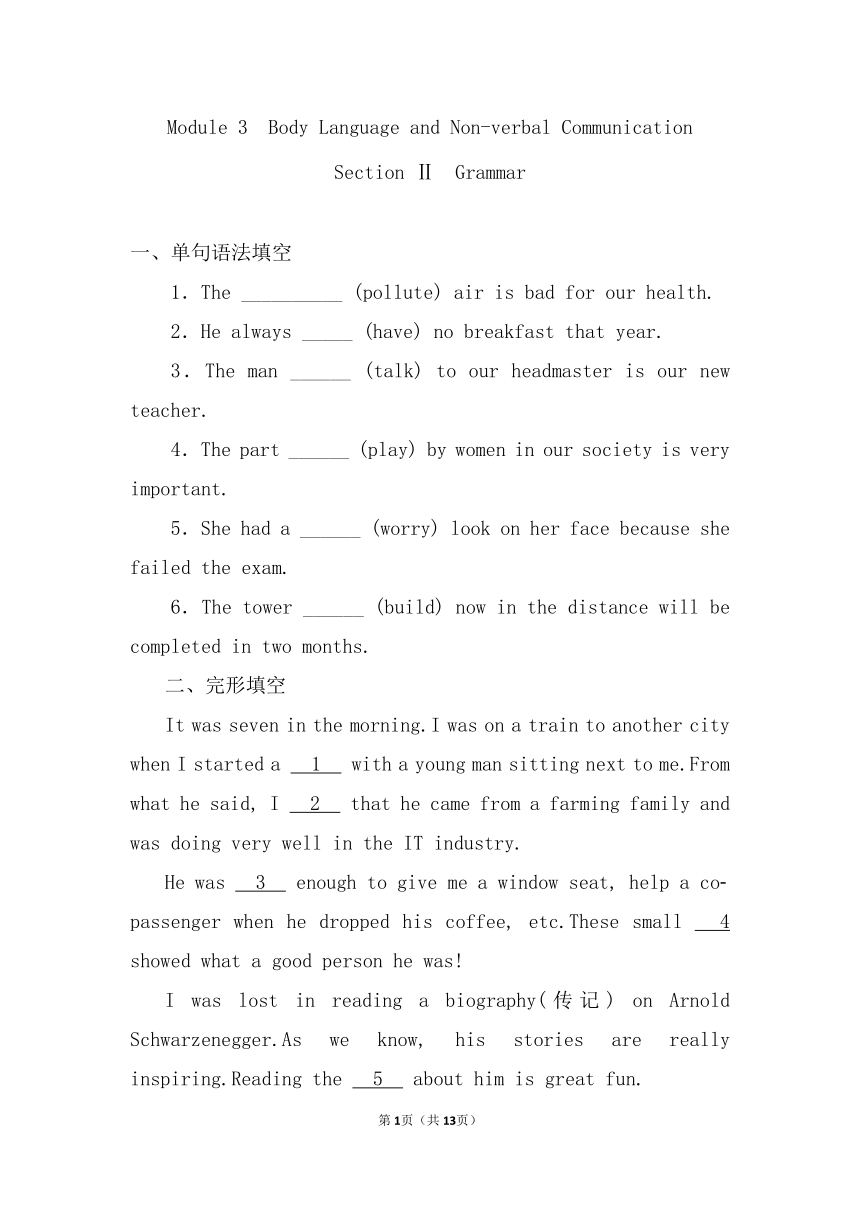
|
|
| 格式 | doc | ||
| 文件大小 | 48.5KB | ||
| 资源类型 | 教案 | ||
| 版本资源 | 外研版 | ||
| 科目 | 英语 | ||
| 更新时间 | 2021-12-08 00:00:00 | ||
图片预览

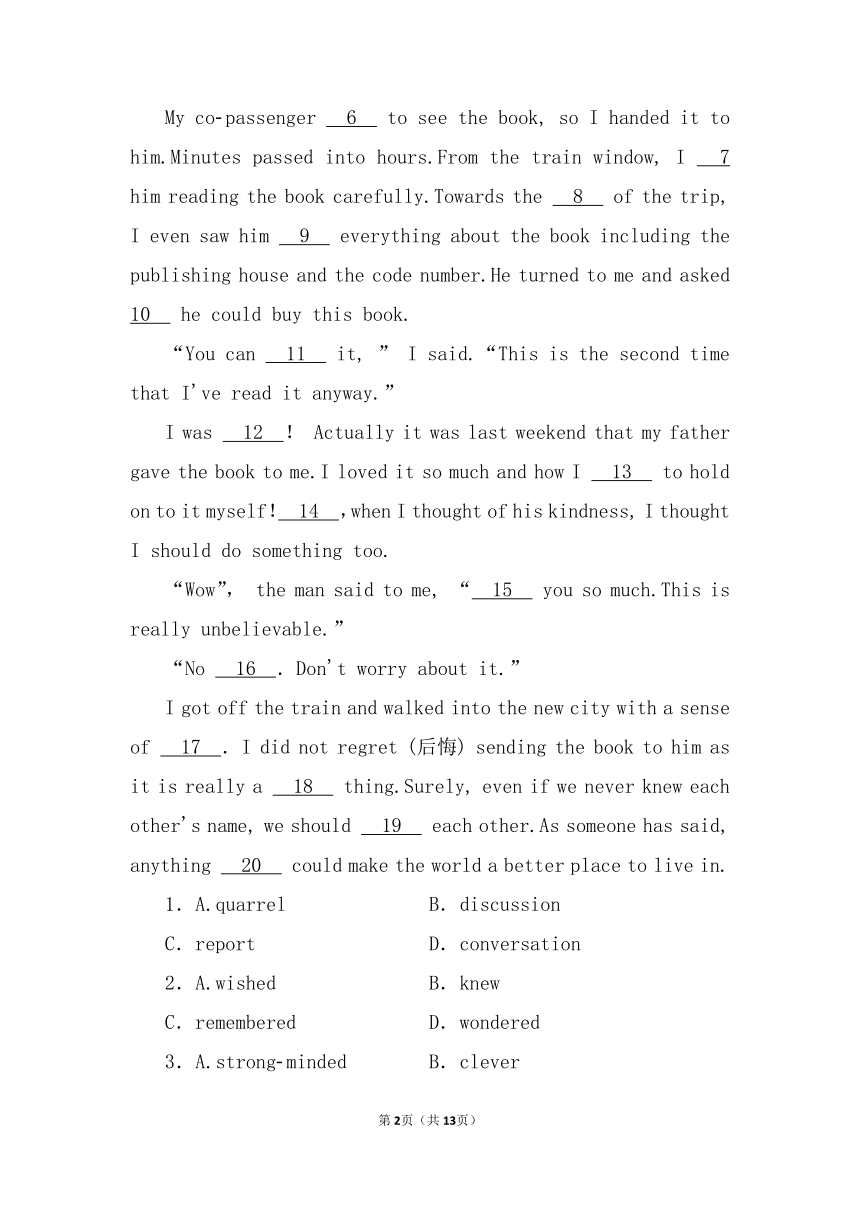
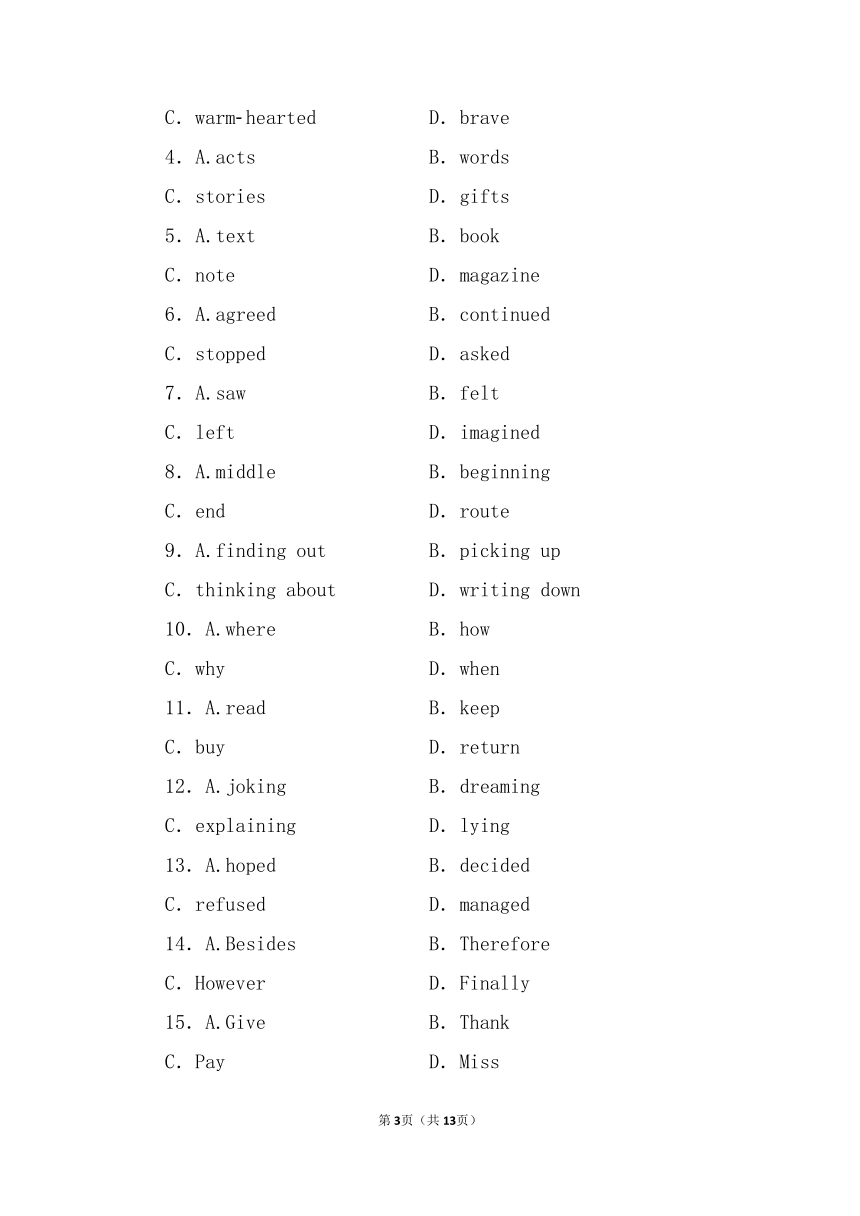
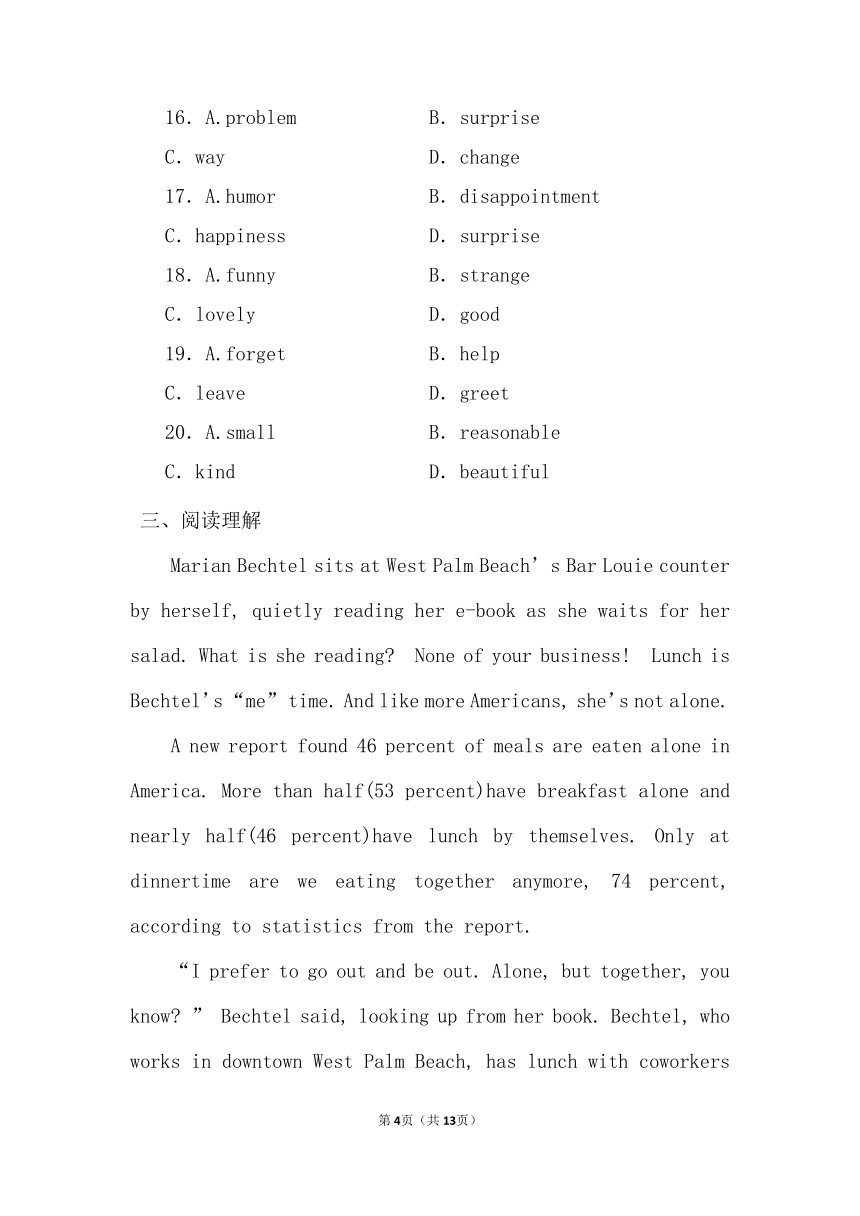
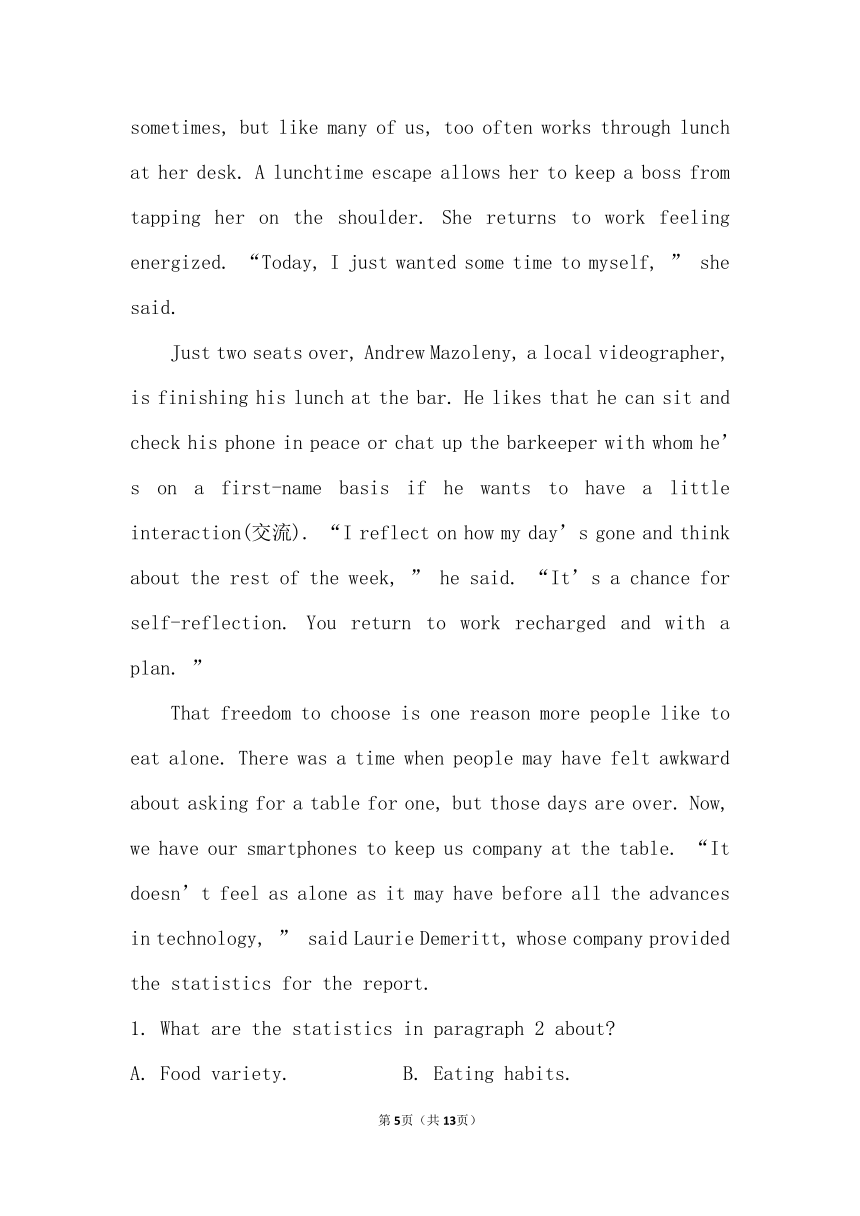
文档简介
Module 3 Body Language and Non-verbal Communication
Section Ⅱ Grammar
一、单句语法填空
1.The __________ (pollute) air is bad for our health.
2.He always _____ (have) no breakfast that year.
3.The man ______ (talk) to our headmaster is our new teacher.
4.The part ______ (play) by women in our society is very important.
5.She had a ______ (worry) look on her face because she failed the exam.
6.The tower ______ (build) now in the distance will be completed in two months.
二、完形填空
It was seven in the morning.I was on a train to another city when I started a 1 with a young man sitting next to me.From what he said, I 2 that he came from a farming family and was doing very well in the IT industry.
He was 3 enough to give me a window seat, help a co passenger when he dropped his coffee, etc.These small 4 showed what a good person he was!
I was lost in reading a biography(传记) on Arnold Schwarzenegger.As we know, his stories are really inspiring.Reading the 5 about him is great fun.
My co passenger 6 to see the book, so I handed it to him.Minutes passed into hours.From the train window, I 7 him reading the book carefully.Towards the 8 of the trip, I even saw him 9 everything about the book including the publishing house and the code number.He turned to me and asked 10 he could buy this book.
“You can 11 it, ” I said.“This is the second time that I've read it anyway.”
I was 12 ! Actually it was last weekend that my father gave the book to me.I loved it so much and how I 13 to hold on to it myself! 14 ,when I thought of his kindness, I thought I should do something too.
“Wow”, the man said to me, “ 15 you so much.This is really unbelievable.”
“No 16 .Don't worry about it.”
I got off the train and walked into the new city with a sense of 17 .I did not regret (后悔) sending the book to him as it is really a 18 thing.Surely, even if we never knew each other's name, we should 19 each other.As someone has said, anything 20 could make the world a better place to live in.
1.A.quarrel B.discussion
C.report D.conversation
2.A.wished B.knew
C.remembered D.wondered
3.A.strong minded B.clever
C.warm hearted D.brave
4.A.acts B.words
C.stories D.gifts
5.A.text B.book
C.note D.magazine
6.A.agreed B.continued
C.stopped D.asked
7.A.saw B.felt
C.left D.imagined
8.A.middle B.beginning
C.end D.route
9.A.finding out B.picking up
C.thinking about D.writing down
10.A.where B.how
C.why D.when
11.A.read B.keep
C.buy D.return
12.A.joking B.dreaming
C.explaining D.lying
13.A.hoped B.decided
C.refused D.managed
14.A.Besides B.Therefore
C.However D.Finally
15.A.Give B.Thank
C.Pay D.Miss
16.A.problem B.surprise
C.way D.change
17.A.humor B.disappointment
C.happiness D.surprise
18.A.funny B.strange
C.lovely D.good
19.A.forget B.help
C.leave D.greet
20.A.small B.reasonable
C.kind D.beautiful
三、阅读理解
Marian Bechtel sits at West Palm Beach’s Bar Louie counter by herself, quietly reading her e-book as she waits for her salad. What is she reading None of your business! Lunch is Bechtel’s “me” time. And like more Americans, she’s not alone.
A new report found 46 percent of meals are eaten alone in America. More than half(53 percent)have breakfast alone and nearly half(46 percent)have lunch by themselves. Only at dinnertime are we eating together anymore, 74 percent, according to statistics from the report.
“I prefer to go out and be out. Alone, but together, you know ” Bechtel said, looking up from her book. Bechtel, who works in downtown West Palm Beach, has lunch with coworkers sometimes, but like many of us, too often works through lunch at her desk. A lunchtime escape allows her to keep a boss from tapping her on the shoulder. She returns to work feeling energized. “Today, I just wanted some time to myself, ” she said.
Just two seats over, Andrew Mazoleny, a local videographer, is finishing his lunch at the bar. He likes that he can sit and check his phone in peace or chat up the barkeeper with whom he’s on a first-name basis if he wants to have a little interaction(交流). “I reflect on how my day’s gone and think about the rest of the week, ” he said. “It’s a chance for self-reflection. You return to work recharged and with a plan. ”
That freedom to choose is one reason more people like to eat alone. There was a time when people may have felt awkward about asking for a table for one, but those days are over. Now, we have our smartphones to keep us company at the table. “It doesn’t feel as alone as it may have before all the advances in technology, ” said Laurie Demeritt, whose company provided the statistics for the report.
1. What are the statistics in paragraph 2 about
A. Food variety. B. Eating habits.
C. Table manners. D. Restaurant service.
2. Why does Bechtel prefer to go out for lunch
A. To meet with her coworkers.
B. To catch up with her work.
C. To have some time on her own.
D. To collect data for her report.
3. What do we know about Mazoleny
A. He makes videos for the bar.
B. He’s fond of the food at the bar.
C. He interviews customers at the bar.
D. He’s familiar with the barkeeper.
4. What is the text mainly about
A. The trend of having meals alone.
B. The importance of self-reflection.
C. The stress from working overtime.
D. The advantage of wireless technology.
四、阅读填句
根据短文内容, 从短文后的选项中选出能填入空白处的最佳选项。选项中有两项为多余选项。
Improving your body language can improve the clarity of your message, make you appear more confident and more attractive, improve your first impressions and even make you feel better. Here are a few tips to improve your body language:
Don’t cross your arms or legs. You have probably already heard you shouldn’t cross your arms as it might make you seem defensive or guarded. 1 Keep your arms and legs open.
2 If there are several people you are talking to, give them all some eye contact to create a better connection and see if they are listening. Keeping too much eye contact might make people uncomfortable. Giving no eye contact might make you seem insecure. If you aren’t used to keeping eye contact it might feel a little hard or scary in the beginning. Keep working on it and you’ll get used to it.
Smile and laugh. Don’t take yourself too seriously. Relax a bit, smile and laugh when someone says something funny. People will be a lot more likely to listen to you if you seem to be a positive person. But don’t be the first to laugh at your own jokes. 3
Smile when you are introduced to someone but don’t keep a smile plastered on your face, or you’ll seem insincere.
Move at a relaxed steady pace. Moving too fast can make you seem nervous and unconfident. 4 It will make you both feel less stressed and more confident at the same time.
With all the above tips, do what feels natural and don’t overdo anything. Try and improve just one piece of body language consciously each day, and you may be surprised just how much clearer and better you can communicate your point with just a little attention to personal development. 5
A. Go ahead and have a try!
B. Learn to slow down a bit.
C. This goes for your legs too.
D. Make good use of hands.
E. Have eye contact, but don’t stare.
F. It makes you seem nervous and needy.
G. This naturally makes you appear more confident.
一、单句语法填空
polluted
had
talking
played
worried
being built
二、完形填空
1.D 根据下文提示 “From what he said...” 可知, 在火车上 “我们” “攀谈”起来。
2.B 从他的话中 “我” 了解了他的一些情况。
3.C 根据下文列举的这位乘客所做的事情“give me a window seat”和“help a co passenger when he dropped his coffee, etc.”可知, 他很热心。
4.A 此空指上文所提到的这位乘客的善意举动。
5.B 此处指上文的 “a biography(传记)” , 所以用book。
6.D 根据下文 “so I handed it to him” 可推知, 他要看 “我” 的书。
7.A 他认真看书的样子是 “我” 通过火车玻璃看到的, 而不是感觉到或想象到的。
8.C 根据下文内容可知, “我们” 说完话, “我” 就下了火车。由此可推知, 此时旅途即将结束了。
9.D 根据下文 “including the publishing house and the code number” 以及这位乘客要买书的想法可推知, 他将这本书的出版商等相关信息记下来。
10.A 在下车之前, 他向 “我” 询问哪里能够买到这本书。
11.B 由文章最后一段中的 “sending the book to him” 可知, “我” 把书送给这位乘客了, 此处是说: “我” 告诉他可以留下这本书, 不用还了。
12.D 由下句可知事实上书是上周末爸爸刚送给 “我” 的, 而 “我” 却说 “This is the second time that I've read it anyway.”由此可推知, “我” 说谎了。
13.A 根据 “I loved it so much” 可知, “我” 是多么希望能拥有它。
14.C “我” 希望能继续拥有这本书, 但 “我” 还是将它送给了这位乘客, 前后是转折关系。
15.B “我” 将书送给他, 他自然是向“我”表示感谢。
16.A 这位乘客对于 “我” 将书送给他的行为表示难以置信, “我” 对他说不客气, 不要担心。
17.C 下文提到 “我” 没有后悔将书送给那位乘客, 故在旅途中经历这些之后 “我” 应该感到很开心。
18.D “我” 没有因为送出自己喜欢的书而后悔, 因为 “我” 觉得那是一件好事。
19.B 本句是全篇的升华, 即使我们互不相识, 我们还是要相互帮助。
20.C 有人说过, 善良的行为会使我们生活的世界变得更美好。
三、阅读理解
1.B。推理判断题。第二段的数据显示美国46%的人是独自吃饭。53%的人的早餐、46%的人的午餐都是独自吃, 只有在晚餐时74%的人会一起吃, 可总结为美国人的吃饭习惯, 故选B 项。
2.C。细节理解题。根据第三段中的A lunchtime escape allows her to keep a boss from tapping her on the shoulder. 和“Today, I just wanted some time to myself” 可知她喜欢拥有属于自己的时间。故选C项。
3.D。推理判断题。根据第四段中的. . . Andrew Mazoleny, a local videographer, is finishing his lunch at the bar. He likes that he can sit and check his phone in peace or chat up the barkeeper with whom he’s on a first-name basis if he wants to have a little interaction. 可知选D项。
4.A。主旨大意题。文章显示美国人喜欢独自就餐, 这样可以给他们带来一些好处。故选A项。
四、阅读填句
1. C。考查对上下文的分析和理解能力。上文说到交叉胳膊会让你看起来处于防御性或自我保护的状态。这同样适用于腿。因此要保持胳膊和腿是开的, 分析本句可知, C项(对腿也是这样的情形)符合题意。
2. E。考查对上下文的分析和理解能力。本题是对这一段的总结。根据本段内容可知, 有多人跟你说话, 要用眼神与他们交流, 但不能老是盯着, 因为会让人不舒服。分析选项可知E项(Have eye contact, but don’t stare )要有眼神交流, 但不能老是盯着, 符合题意, 故选E。
3. F。考查对上下文的分析和理解能力。根据空前内容, 要微笑, 不要把自己弄得太严肃了, 放松些, 当有人讲有趣的事时要怎么样。但是你不要第一个因自己的笑话而发笑。因为这会让你看起来紧张。分析选项可知F项与本段内容相符, 故选F。
4. B。考查对上下文的分析和理解能力。根据本段第一句“Move at a relaxed steady pace. ”可知语速要平稳, 不能太快否则会使你显得紧张和不自信。因此要学会放慢速度。它会让你在同一时间感到更少的压力和更自信。分析选项可知B项(学会放慢速度)符合题意, 故选B。
5. A。考查对上下文的分析和理解能力。根据本段的内容可知, 根据上文的建议, 每天练习肢体语言, 能更清楚、更好地表达你自己。最后提出建议——去试一试! 分析选项可知A项符合题意, 故选A。
第13页(共13页)
Section Ⅱ Grammar
一、单句语法填空
1.The __________ (pollute) air is bad for our health.
2.He always _____ (have) no breakfast that year.
3.The man ______ (talk) to our headmaster is our new teacher.
4.The part ______ (play) by women in our society is very important.
5.She had a ______ (worry) look on her face because she failed the exam.
6.The tower ______ (build) now in the distance will be completed in two months.
二、完形填空
It was seven in the morning.I was on a train to another city when I started a 1 with a young man sitting next to me.From what he said, I 2 that he came from a farming family and was doing very well in the IT industry.
He was 3 enough to give me a window seat, help a co passenger when he dropped his coffee, etc.These small 4 showed what a good person he was!
I was lost in reading a biography(传记) on Arnold Schwarzenegger.As we know, his stories are really inspiring.Reading the 5 about him is great fun.
My co passenger 6 to see the book, so I handed it to him.Minutes passed into hours.From the train window, I 7 him reading the book carefully.Towards the 8 of the trip, I even saw him 9 everything about the book including the publishing house and the code number.He turned to me and asked 10 he could buy this book.
“You can 11 it, ” I said.“This is the second time that I've read it anyway.”
I was 12 ! Actually it was last weekend that my father gave the book to me.I loved it so much and how I 13 to hold on to it myself! 14 ,when I thought of his kindness, I thought I should do something too.
“Wow”, the man said to me, “ 15 you so much.This is really unbelievable.”
“No 16 .Don't worry about it.”
I got off the train and walked into the new city with a sense of 17 .I did not regret (后悔) sending the book to him as it is really a 18 thing.Surely, even if we never knew each other's name, we should 19 each other.As someone has said, anything 20 could make the world a better place to live in.
1.A.quarrel B.discussion
C.report D.conversation
2.A.wished B.knew
C.remembered D.wondered
3.A.strong minded B.clever
C.warm hearted D.brave
4.A.acts B.words
C.stories D.gifts
5.A.text B.book
C.note D.magazine
6.A.agreed B.continued
C.stopped D.asked
7.A.saw B.felt
C.left D.imagined
8.A.middle B.beginning
C.end D.route
9.A.finding out B.picking up
C.thinking about D.writing down
10.A.where B.how
C.why D.when
11.A.read B.keep
C.buy D.return
12.A.joking B.dreaming
C.explaining D.lying
13.A.hoped B.decided
C.refused D.managed
14.A.Besides B.Therefore
C.However D.Finally
15.A.Give B.Thank
C.Pay D.Miss
16.A.problem B.surprise
C.way D.change
17.A.humor B.disappointment
C.happiness D.surprise
18.A.funny B.strange
C.lovely D.good
19.A.forget B.help
C.leave D.greet
20.A.small B.reasonable
C.kind D.beautiful
三、阅读理解
Marian Bechtel sits at West Palm Beach’s Bar Louie counter by herself, quietly reading her e-book as she waits for her salad. What is she reading None of your business! Lunch is Bechtel’s “me” time. And like more Americans, she’s not alone.
A new report found 46 percent of meals are eaten alone in America. More than half(53 percent)have breakfast alone and nearly half(46 percent)have lunch by themselves. Only at dinnertime are we eating together anymore, 74 percent, according to statistics from the report.
“I prefer to go out and be out. Alone, but together, you know ” Bechtel said, looking up from her book. Bechtel, who works in downtown West Palm Beach, has lunch with coworkers sometimes, but like many of us, too often works through lunch at her desk. A lunchtime escape allows her to keep a boss from tapping her on the shoulder. She returns to work feeling energized. “Today, I just wanted some time to myself, ” she said.
Just two seats over, Andrew Mazoleny, a local videographer, is finishing his lunch at the bar. He likes that he can sit and check his phone in peace or chat up the barkeeper with whom he’s on a first-name basis if he wants to have a little interaction(交流). “I reflect on how my day’s gone and think about the rest of the week, ” he said. “It’s a chance for self-reflection. You return to work recharged and with a plan. ”
That freedom to choose is one reason more people like to eat alone. There was a time when people may have felt awkward about asking for a table for one, but those days are over. Now, we have our smartphones to keep us company at the table. “It doesn’t feel as alone as it may have before all the advances in technology, ” said Laurie Demeritt, whose company provided the statistics for the report.
1. What are the statistics in paragraph 2 about
A. Food variety. B. Eating habits.
C. Table manners. D. Restaurant service.
2. Why does Bechtel prefer to go out for lunch
A. To meet with her coworkers.
B. To catch up with her work.
C. To have some time on her own.
D. To collect data for her report.
3. What do we know about Mazoleny
A. He makes videos for the bar.
B. He’s fond of the food at the bar.
C. He interviews customers at the bar.
D. He’s familiar with the barkeeper.
4. What is the text mainly about
A. The trend of having meals alone.
B. The importance of self-reflection.
C. The stress from working overtime.
D. The advantage of wireless technology.
四、阅读填句
根据短文内容, 从短文后的选项中选出能填入空白处的最佳选项。选项中有两项为多余选项。
Improving your body language can improve the clarity of your message, make you appear more confident and more attractive, improve your first impressions and even make you feel better. Here are a few tips to improve your body language:
Don’t cross your arms or legs. You have probably already heard you shouldn’t cross your arms as it might make you seem defensive or guarded. 1 Keep your arms and legs open.
2 If there are several people you are talking to, give them all some eye contact to create a better connection and see if they are listening. Keeping too much eye contact might make people uncomfortable. Giving no eye contact might make you seem insecure. If you aren’t used to keeping eye contact it might feel a little hard or scary in the beginning. Keep working on it and you’ll get used to it.
Smile and laugh. Don’t take yourself too seriously. Relax a bit, smile and laugh when someone says something funny. People will be a lot more likely to listen to you if you seem to be a positive person. But don’t be the first to laugh at your own jokes. 3
Smile when you are introduced to someone but don’t keep a smile plastered on your face, or you’ll seem insincere.
Move at a relaxed steady pace. Moving too fast can make you seem nervous and unconfident. 4 It will make you both feel less stressed and more confident at the same time.
With all the above tips, do what feels natural and don’t overdo anything. Try and improve just one piece of body language consciously each day, and you may be surprised just how much clearer and better you can communicate your point with just a little attention to personal development. 5
A. Go ahead and have a try!
B. Learn to slow down a bit.
C. This goes for your legs too.
D. Make good use of hands.
E. Have eye contact, but don’t stare.
F. It makes you seem nervous and needy.
G. This naturally makes you appear more confident.
一、单句语法填空
polluted
had
talking
played
worried
being built
二、完形填空
1.D 根据下文提示 “From what he said...” 可知, 在火车上 “我们” “攀谈”起来。
2.B 从他的话中 “我” 了解了他的一些情况。
3.C 根据下文列举的这位乘客所做的事情“give me a window seat”和“help a co passenger when he dropped his coffee, etc.”可知, 他很热心。
4.A 此空指上文所提到的这位乘客的善意举动。
5.B 此处指上文的 “a biography(传记)” , 所以用book。
6.D 根据下文 “so I handed it to him” 可推知, 他要看 “我” 的书。
7.A 他认真看书的样子是 “我” 通过火车玻璃看到的, 而不是感觉到或想象到的。
8.C 根据下文内容可知, “我们” 说完话, “我” 就下了火车。由此可推知, 此时旅途即将结束了。
9.D 根据下文 “including the publishing house and the code number” 以及这位乘客要买书的想法可推知, 他将这本书的出版商等相关信息记下来。
10.A 在下车之前, 他向 “我” 询问哪里能够买到这本书。
11.B 由文章最后一段中的 “sending the book to him” 可知, “我” 把书送给这位乘客了, 此处是说: “我” 告诉他可以留下这本书, 不用还了。
12.D 由下句可知事实上书是上周末爸爸刚送给 “我” 的, 而 “我” 却说 “This is the second time that I've read it anyway.”由此可推知, “我” 说谎了。
13.A 根据 “I loved it so much” 可知, “我” 是多么希望能拥有它。
14.C “我” 希望能继续拥有这本书, 但 “我” 还是将它送给了这位乘客, 前后是转折关系。
15.B “我” 将书送给他, 他自然是向“我”表示感谢。
16.A 这位乘客对于 “我” 将书送给他的行为表示难以置信, “我” 对他说不客气, 不要担心。
17.C 下文提到 “我” 没有后悔将书送给那位乘客, 故在旅途中经历这些之后 “我” 应该感到很开心。
18.D “我” 没有因为送出自己喜欢的书而后悔, 因为 “我” 觉得那是一件好事。
19.B 本句是全篇的升华, 即使我们互不相识, 我们还是要相互帮助。
20.C 有人说过, 善良的行为会使我们生活的世界变得更美好。
三、阅读理解
1.B。推理判断题。第二段的数据显示美国46%的人是独自吃饭。53%的人的早餐、46%的人的午餐都是独自吃, 只有在晚餐时74%的人会一起吃, 可总结为美国人的吃饭习惯, 故选B 项。
2.C。细节理解题。根据第三段中的A lunchtime escape allows her to keep a boss from tapping her on the shoulder. 和“Today, I just wanted some time to myself” 可知她喜欢拥有属于自己的时间。故选C项。
3.D。推理判断题。根据第四段中的. . . Andrew Mazoleny, a local videographer, is finishing his lunch at the bar. He likes that he can sit and check his phone in peace or chat up the barkeeper with whom he’s on a first-name basis if he wants to have a little interaction. 可知选D项。
4.A。主旨大意题。文章显示美国人喜欢独自就餐, 这样可以给他们带来一些好处。故选A项。
四、阅读填句
1. C。考查对上下文的分析和理解能力。上文说到交叉胳膊会让你看起来处于防御性或自我保护的状态。这同样适用于腿。因此要保持胳膊和腿是开的, 分析本句可知, C项(对腿也是这样的情形)符合题意。
2. E。考查对上下文的分析和理解能力。本题是对这一段的总结。根据本段内容可知, 有多人跟你说话, 要用眼神与他们交流, 但不能老是盯着, 因为会让人不舒服。分析选项可知E项(Have eye contact, but don’t stare )要有眼神交流, 但不能老是盯着, 符合题意, 故选E。
3. F。考查对上下文的分析和理解能力。根据空前内容, 要微笑, 不要把自己弄得太严肃了, 放松些, 当有人讲有趣的事时要怎么样。但是你不要第一个因自己的笑话而发笑。因为这会让你看起来紧张。分析选项可知F项与本段内容相符, 故选F。
4. B。考查对上下文的分析和理解能力。根据本段第一句“Move at a relaxed steady pace. ”可知语速要平稳, 不能太快否则会使你显得紧张和不自信。因此要学会放慢速度。它会让你在同一时间感到更少的压力和更自信。分析选项可知B项(学会放慢速度)符合题意, 故选B。
5. A。考查对上下文的分析和理解能力。根据本段的内容可知, 根据上文的建议, 每天练习肢体语言, 能更清楚、更好地表达你自己。最后提出建议——去试一试! 分析选项可知A项符合题意, 故选A。
第13页(共13页)
